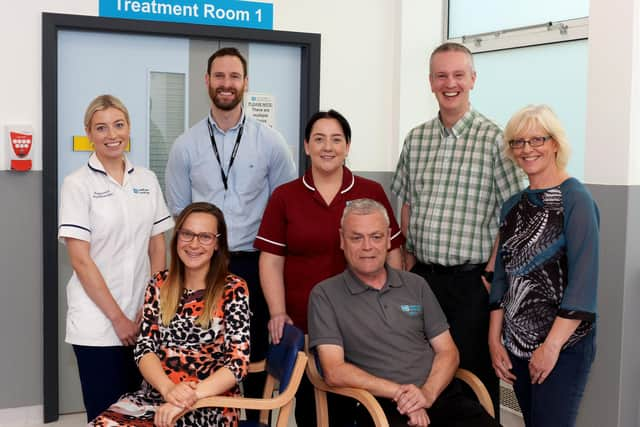New service for patients suffering minor strokes in the Southern Health and Social Care Trust area
and live on Freeview channel 276
The Trust said it has developed a new ‘ambulatory and virtual service for patients with mimic or minor stroke related symptoms’. A spokesperson said: “Around 600 patients are admitted to Southern Trust hospitals each year with stroke. However, similar to national trends, around one third of stroke related admissions include minor stroke, transient ischaemic attack or stroke mimics like hypoglycaemia or migraine aura, where a hospital stay is not always necessary.”
-


-
Director of Adult Community Services for the Trust, Brian Beattie explains: “Stroke is a serious life-threatening medical emergency, so rapid assessment of all suspected patients is vital to ensure they get the most appropriate treatment. We now have the very latest technology at both Daisy Hill and Craigavon hospitals to help us diagnose which patients need admission for acute stroke treatment and to identify those who will benefit from another service.
Advertisement
Hide AdAdvertisement
Hide Ad“Given the choice, most people would avoid a hospital admission and indeed recover better at home. Now, if a moderate or severe stroke has been ruled out, the patient may be discharged home and referred back as an outpatient to be monitored virtually or to the ambulatory team for follow up tests, advice and specialist support as required.”
The team is based at Craigavon Area Hospital and includes a Consultant Stroke Specialist, Stroke Specialist Nurse, a Specialist Physiotherapist and an Administrative Officer. They will work closely with Emergency Department and inpatient colleagues to identify patients suitable for their support. They will also link with their community colleagues to share skills and experience, helping to prevent hospital admission and supporting discharge where they can.
Mr Beattie adds: “We are continually working to improve how we provide our services. We have a team of dedicated medical, nursing, diagnostics and allied health professional staff, supporting diagnosis, treatment and rehabilitation of stroke patients in hospital and community services across the Southern Trust. The ambulatory and virtual stroke service is a welcome addition to this range of stroke services, offering support to those who need some hospital care but not necessarily an overnight stay. This helps us to give more patients the right care in the right place, making the best use of acute hospital beds and more importantly giving patients a better experience.”
Always phone 999 with suspected stroke symptoms.
FAST: Face, Arm, Speech, and Time to call 999.
- Face – Has their face fallen on one side? Can they smile?
- Arms – Can they raise both arms and keep them there?
- Speech – Is their speech slurred?
- Time – Time to call 999 if you see any single one of these signs
Southern Trust patients requiring acute stroke treatment will be transferred to Craigavon Area Hospital or the Royal Victoria Hospital and those who need continued rehabilitation will return to their local stroke/rehabilitation ward at Daisy Hill, Lurgan or South Tyrone Hospitals.